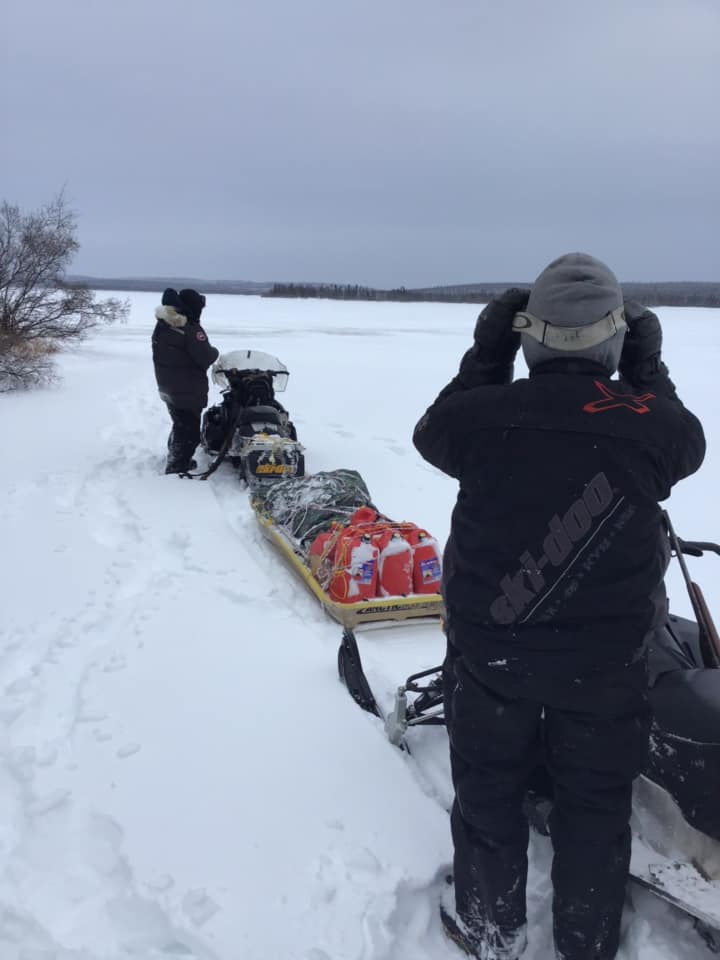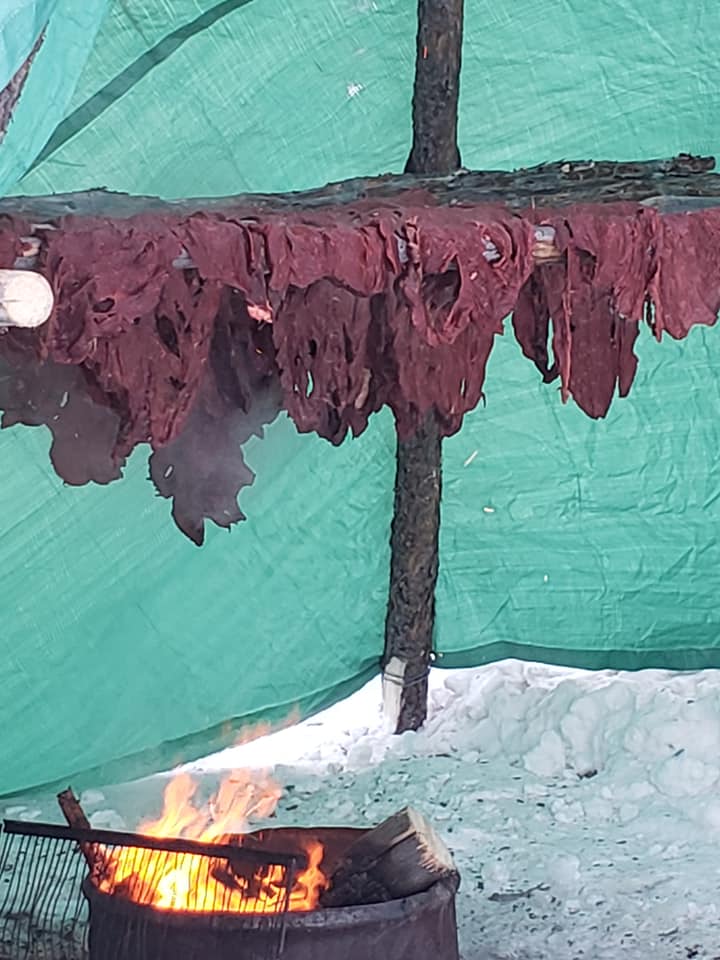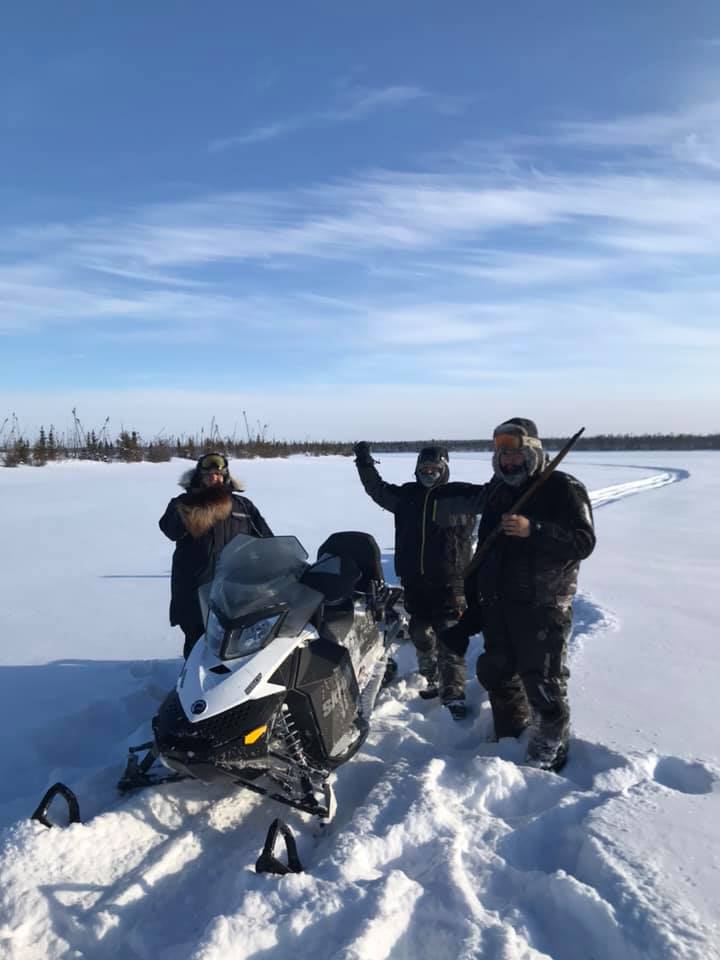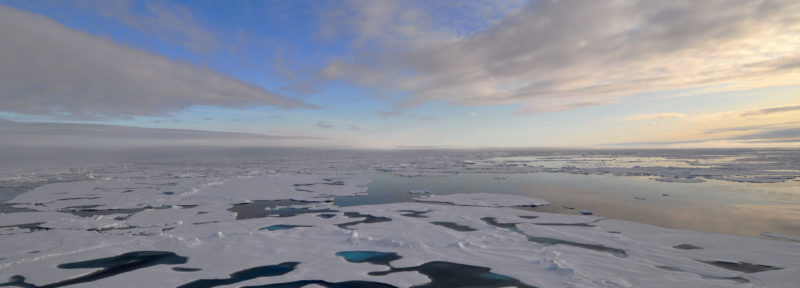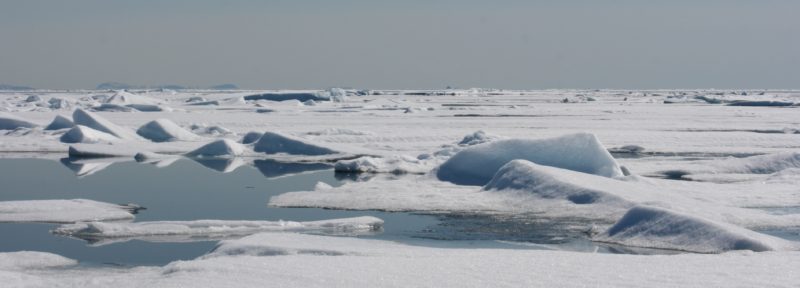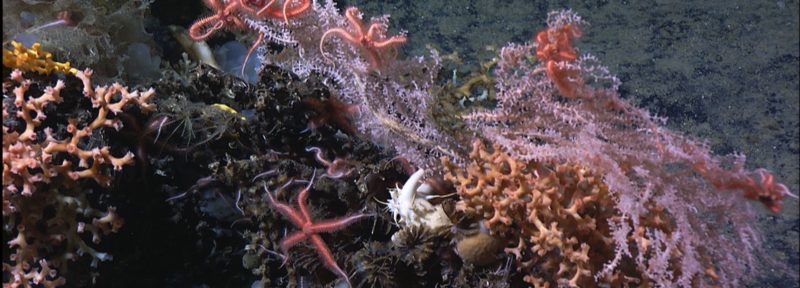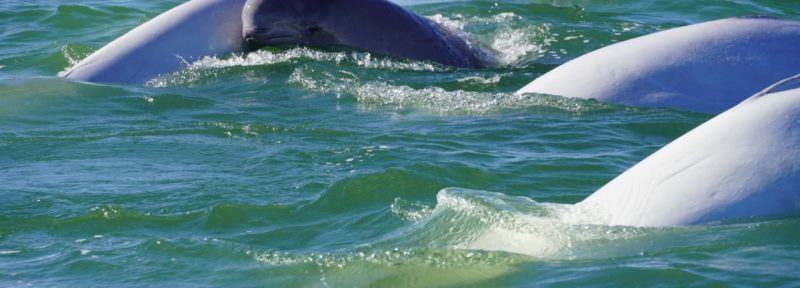A New Caribou Harvesting Project in Tadoule Lake
Caribou hunters near Tadoule Lake, Manitoba.
ᐃᓕᓴᕆᔭᐅᔪᖅ: Tadoule Lake Community Caribou Harvesting Program
For Ray Ellis, an elder with the Sayisi Dene First Nation located on the shores of Tadoule Lake in Manitoba, hunting is a way of life.
“I started hunting and trapping very early, and then I became a professional hunting guide,” he said.
During the winter of 2021, Ray served as the project coordinator for the Caribou Harvesting Project in Tadoule Lake. The project, funded by Oceans North, followed a successful summer fishing harvest project in 2020, and offered financial and logistical support to local harvesters to be on the land, practice land skills with youth and provide healthy, nutritious food for the community. Oceans North is working with governments, scientists and industry in this region to secure long-term environmental protection of Western Hudson Bay’s marine ecosystem.
Throughout the history of the Sayisi Dene, caribou have provided food, clothing and shelter for the winter. Hunting continues to be an integral part of community life. Caribou meat provides a healthy alternative to store-bought food, imported from the south at high prices.
For the caribou project last winter, Ray recruited harvesters from the community. Youth were paired with four, experienced Sayisi Dene hunters to learn hands-on, practical skills and acquire knowledge about the harvesting areas. Community elders guided the planning for the harvest, drawing on their knowledge of both traditional conservation principles and best hunting practices for a sustainable harvest.
Over the winter, hunters and youth headed out on overnight trips looking for caribou in locations known to the community. Depending on the distance they had to travel to spot the herd and weather, hunters spent the day on the land or overnighted for two or three days.
Much preparation was required prior to departure to ensure every trip was safe and productive. Ray contacted hunters and youth and made sure they had appropriate equipment, including snowmobiles, gas, oil, food, and ammunition. Once the program was up and running, Ray conducted ongoing repairs and safety checks to ensure snowmobiles were running smoothly, and ordered parts when needed.
One hunter from the community, Kyle Powerhorn, described a trip in these words: “Once we decide where we’re going, we make sure we have lots of gas and take off. Sometimes we ride for five or six hours to get to a good spot to set up camp and look for caribou. Once you see a caribou, you have to make sure the caribou is killed quickly and with respect. You have to use the proper ammunition and take a good shot to make sure that the caribou is not wounded and able to get away and suffer. Then we carry them closer to our tent, where they are cut [prepared for transport] and put on the toboggan sled. We bring the caribou back to our houses to be divided amongst community members.”
Every part of the caribou is used by the Sayisi Dene, including its head, which traditionally is roasted on a fire, he said.
Caribou meat hangs over a fire near Tadoule Lake, Manitoba.
ᐃᓕᓴᕆᔭᐅᔪᖅ: Tadoule Lake Community Caribou Harvesting Program
Youth participation in the project was vital. They learned traditional sustainable camping practices, traditional hunting methods, caribou cleaning and meat preparation. Youth also took part in the traditional practice of sharing the harvest with community members.
“This is a good program that is helping to motivate youth in the community,” Ray said. “We need to teach our youth the right way of hunting and conservation. We need to get them on the land and if they get some money from doing it, all the better.”
In recent years, long hunting trips have become cost-prohibitive and not many people in the community can afford them, Ray said.
“Caribou hunting can get very expensive, once you pay for gas, shells and food,” he said. “That’s why we appreciate programs like this that help hunters pay for gas, oil, snowmobile repairs and also provide some financial benefits.”
The program was meant to foster and rekindle some of the harvesting knowledge and practices that have been lost. The Saysi Dene community supports the program and hopes it will continue in some form.
Canada’s Truth and Reconciliation Commission noted that for generations Residential Schools tried to undermine the transfer of harvesting knowledge and culture by forcibly removing children from the community and placing them in distant institutions that denigrated their culture and language. In the 1950s, government authorities forcibly relocated the Sayisi Dene community to the Town of Churchill, causing social breakdown, trauma and loss of life. On their own initiative, the Sayisi Dene returned to their traditional territory in the 1970s. In 2016, the federal government apologized and paid compensation to the community for this devastating action.
The leadership of the nearby Seal River Watershed Protected Area Initiative have also noted that Tadoule Lake’s fish and caribou harvesting programs further the ongoing efforts to establish the Seal River Watershed as an Indigenous Protected Area.
The long-term goal for the community harvesting programming is to become self- sustaining. As it counteracts the loss of traditional knowledge and land skills, food security and community well-being will be improved. It can also be a source for developing new activities, such as science-based environmental monitoring and eco-tourism.
Hunters with Caribou Harvest Program at Tadoule Lake, Manitoba.
ᐃᓕᓴᕆᔭᐅᔪᖅ: Tadoule Lake Community Caribou Harvesting Program
The youth of Sayisi Dene are the future. They are the next “guardians of the land” who can document, promote and model conservation practices that reflect traditional laws and values. It will fall to this new generation to design and develop conservation management practices for their traditional territory.
Felix Meza is a Manitoba-based contractor with Oceans North.

